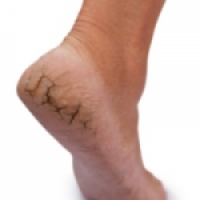If you have dried, cracked heels, you may also suffer from pain, especially when wearing tight footwear that puts stress on the heels. The following are some home remedies that can be used to treat cracked heels. Cocoa butter and shea butter can both be applied and left on overnight to help nourish dry skin. Additionally, castor oil, another natural moisturizer, contains omega fatty acids that help provide extra hydration. Coconut oil is another remedy that is ideal for any type of dry skin. Vitamin E oil and petroleum jelly are also great for hydrating cracked skin.
Cracked heels are unsightly and can cause further damage to your shoes and feet. If you have any concerns, contact Dr. Kenneth Donovan from Advanced Care Foot and Ankle. Our doctor will treat your foot and ankle needs.
Cracked Heels
Cracked heels are unappealing, and make it harder for you walk around in sandals. Not only may they look bad, but they can also tear stockings, socks, and wear out your shoes. There are several methods to help restore a cracked heel and prevent further damage.
How do you get them?
Dry skin is the number one culprit in creating cracked heels. Many athletes, walkers, joggers, and even swimmers suffer from cracked heels. Age and skin oil production play a role to getting cracked heels as well.
Promote Healing
Over the counter medicines can help, especially for those that need instant relief, or who suffer from chronic dry feet.
Wear Socks – wearing socks with medicated creams, helps lock in moisture so it can stay on longer.
Moisturizers – applying it both day and night will help alleviate dryness which causes cracking.
Pumice Stones – these remove dead skin, and then you can massage cream onto your foot. This way the cream will be absorbed. The skin needs to be exfoliated; therefore the outer layer dead skin needs removal.
Change in Diet
Eating healthy, with a well-balanced diet, will give the skin a fresh and radiant look. Your body responds to what kinds of food you ingest. Omega-3 fatty acids and zinc supplements will also help with skin tissue.
Most importantly seek a health professional for foot care if something is wrong or doesn’t seem to be working. A podiatrist will help you with any questions or information needed.
If you have any questions, please feel free to contact one of our offices located in New Jersey. We offer the newest diagnostic tools and technologies to treat your foot and ankle needs.

